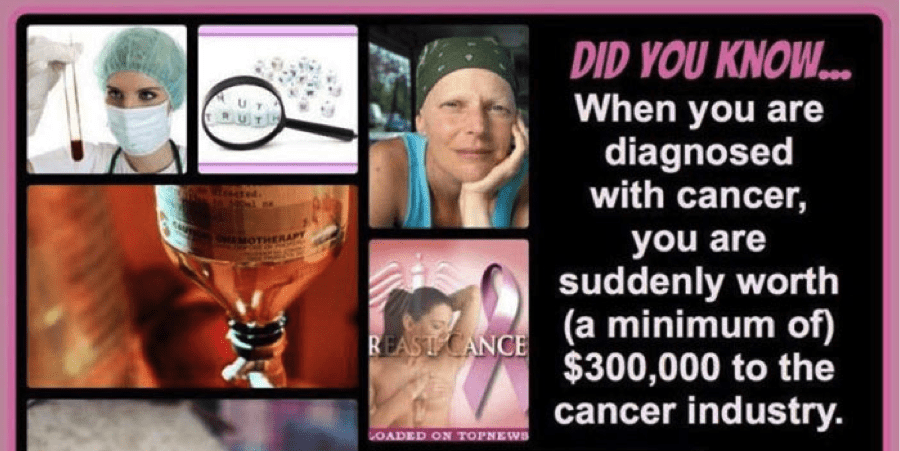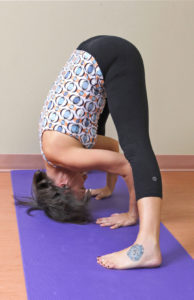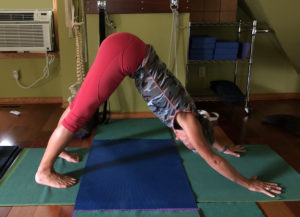In 2004, the American Journal of Clinical Oncology published this 11-year research finding — 97% of chemotherapy does not work. WOW, who knew? This research result chalks up as one of the world’s best-kept secrets given most cancer patients over a decade later are still treated with chemotherapy. In fact, chemotherapy remains the standard treatment for many types of cancer.
With so little reward and so much pain associated with chemotherapy, the question remains, “Why do it?” American M.D. Peter Glidden asserts we do it because prescribing doctors get a substantial cut of the chemo drug cost charged by pharmaceutical companies. Apparently, they are not the only ones getting rich off cancer treatment. Glidden further assures us that medicine in the US is a for-profit industry directed by MDs to the patients’ demise. In a country where only MDs can treat cancer, he claims the war on this dreaded disease has been lost. So much so that the American Cancer Society no longer talks about a cure. Instead, they focus on a five-year survivability window. For those of us living above the 49th parallel, all of this sounds sadly familiar. Unfortunately, what often gets established in the American economy is quietly followed suit here in Canada.
Significant medical costs and long treatment wait-times in Canada are shifting responsibility for personal wellness back onto our shoulders. This is not a bad thing, but does require each of us to do our homework before we make any treatment decisions. In order to prepare yourself and support your decision making, Glidden offers the following 10 questions for every cancer patient to ask of their doctor:
- Does the therapy you are recommending cure my cancer?
- What causes my cancer?
- If the treatment you recommend does not cure my cancer, what can I expect?
- What side effects from the cancer treatment can I expect?
- Can the cancer treatment give me cancer?
- How are you going to manage the side effects of the treatment if they happen?
- What will happen to the quality of my life while I am undergoing this treatment?
- How much will you profit from this treatment?
- How much will the hospital profit from this treatment?
- I would like to talk to five of your patients in my same demographic who had the same type of cancer and the same kind of treatment you recommend to see how they are doing. Can you arrange that? (Personally, I love this last question!)
In a similar vein but focused on breast cancer, “healthy women all over the world have been disfigured, disempowered and brainwashed into believing that their beautiful nurturing breasts have only one objective…to kill them.” This statement introduces a documentary titled, The Promise, which uncovers several truths about breast screening programs worldwide. Truths such as —
I believe that if you did have a tumor, the last thing you would want to do is crush that tumor between two plates, because that would spread it. Dr. Sarah Mybill, General Practitioner
I think if a woman from the age of 50 has a mammogram every year, or every two years, she’s going to get breast cancer as a direct result from that. Dr. Patrick Kingsley, Clinical Ecologist
What recipient of a breast mammogram would not want better detection tools? And they are out there in the form of breast thermography, for one example.
With thermography as your regular screening tool, it’s likely that you would have the opportunity to make adjustments to your diet, beliefs, and lifestyle to transform your cells before they became cancerous. Talk about true prevention. Christiane Northrup, M.D.
Fortunately, there is more good news. An overwhelming number of published studies exist on breast mammogram examinations and their failure to produce the “promised” benefits. See a small sampling of 55 such research abstracts here. To summarize some of these studies deeply disturbing results — breast mammography has also been shown to increase the risk of breast cancer along with other negative implications for both physical and mental health. If you haven’t been convinced yet, more research exists here.
Professor and cancer specialist, Michael Baum, sums it up nicely by saying
U-turns do not embarrass clinical scientists, unlike politicians: if the evidence changes then our minds must change. As the national [breast screening] programme began to run its course, two disturbing observations made me begin to question my original support. First, about 10 years after the initiation of the service, updated analyses of the original data set by independent groups in Europe and the US found that the initial estimate of benefit in the reduction of breast cancer mortality was grossly exaggerated. Michael Baum, leading British surgical oncologist specializing in breast cancer treatment
To empower your health and grow your self-knowledge, sign up here for a free 9-part documentary (release date May 16) on preventing and beating cancer. Keep the war on cancer alive.
For more on self-reliance and self-knowledge, click here.





